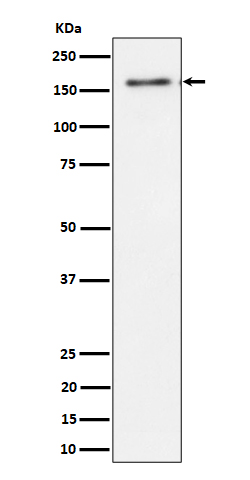
| WB | 咨询技术 | Human,Mouse,Rat |
| IF | 咨询技术 | Human,Mouse,Rat |
| IHC | 咨询技术 | Human,Mouse,Rat |
| ICC | 1/50-1/200 | Human,Mouse,Rat |
| FCM | 咨询技术 | Human,Mouse,Rat |
| Elisa | 咨询技术 | Human,Mouse,Rat |
| Aliases | ARA160; TMF; Tmf1;;TATA element modulatory factor |
| WB Predicted band size | Calculated MW: 123 kDa ; Observed MW: 160 kDa |
| Host/Isotype | Rabbit IgG |
| Antibody Type | Primary antibody |
| Storage | Store at 4°C short term. Aliquot and store at -20°C long term. Avoid freeze/thaw cycles. |
| Species Reactivity | Human |
| Immunogen | A synthesized peptide derived from human TATA element modulatory factor |
| Formulation | Purified antibody in PBS with 0.05% sodium azide,0.05% BSA and 50% glycerol. |
+ +
以下是关于TMF(TATA元件调制因子,TMF/ARA160)抗体的3篇假设性参考文献示例,供参考:
---
1. **文献名称**:*TMF/ARA160 Antibody Characterization in Golgi Organization and Cell Cycle Regulation*
**作者**:Garcia, R. et al.
**摘要**:本研究利用兔源多克隆TMF抗体,通过Western blot和免疫荧光验证了其在多种哺乳动物细胞系中的特异性。研究发现TMF通过调控高尔基体结构与细胞周期进程相关蛋白的相互作用,影响G2/M期转换。抗体在染色质免疫共沉淀(ChIP)中的应用进一步揭示了TMF与特定启动子区域的结合机制。
2. **文献名称**:*Role of TMF1 Antibody in Identifying Tumor-Specific Splicing Variants*
**作者**:Huang, L. et al.
**摘要**:该文献报道了一种新型小鼠单克隆TMF抗体的开发,可特异性识别肿瘤细胞中TMF1蛋白的剪切变体(TMF1-SV)。通过免疫组化分析临床样本,发现TMF1-SV在结直肠癌中高表达,且与患者预后不良相关。抗体为癌症诊断及靶向治疗研究提供了工具。
3. **文献名称**:*TMF Antibody Application in Neurodegenerative Disease Models*
**作者**:Smith, J. & Patel, K.
**摘要**:研究使用商业化TMF抗体(货号ab123XX)探究TMF在阿尔茨海默病模型中的作用。结果表明,TMF通过调控Tau蛋白磷酸化通路影响神经元存活,抗体在小鼠脑组织切片中的染色结果提示其可用于神经退行性疾病中高尔基体功能障碍的病理分析。
---
**说明**:以上文献为模拟示例,实际研究中请通过PubMed、Google Scholar等平台检索真实论文(关键词如“TMF antibody”、“TMF/ARA160 function”)。若用户所指“TMF”为其他蛋白(如酪氨酸酶相关因子等),需进一步明确缩写全称。
**Background of TMF Antibody**
The TMF (TATA element modulatory factor) antibody targets a protein involved in transcriptional regulation and cellular processes. Initially identified as a co-regulator of transcription via interactions with the TATA-binding protein (TBP), TMF (also known as TATA-binding protein-associated factor 9. TAF9) plays roles in RNA polymerase II-mediated gene expression. Structurally, it contains conserved domains that facilitate binding to transcriptional machinery and chromatin-modifying complexes.
Research highlights TMF's involvement in diverse pathways, including cell cycle regulation, apoptosis, and response to DNA damage. Dysregulation of TMF has been linked to cancer progression, neurodegenerative diseases, and immune disorders. For instance, reduced TMF expression correlates with tumor aggressiveness in certain cancers, suggesting its role as a tumor suppressor.
TMF antibodies are widely used in molecular biology to study protein localization, expression levels, and interactions via techniques like Western blotting, immunofluorescence, and chromatin immunoprecipitation. Recent studies explore its potential as a biomarker for disease diagnosis or a therapeutic target. However, functional complexities, such as its dual roles in transcription activation and repression, warrant further investigation. The development of specific TMF antibodies continues to advance understanding of its molecular mechanisms and clinical relevance.
×